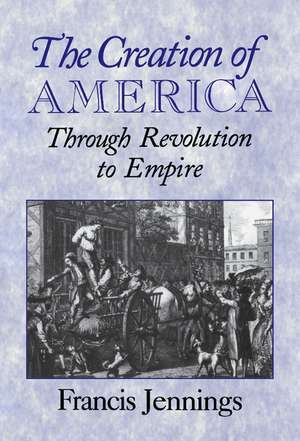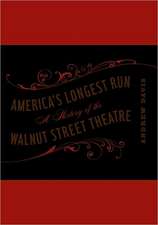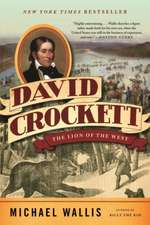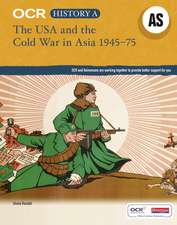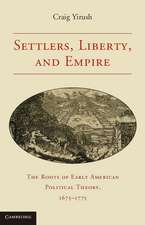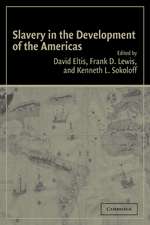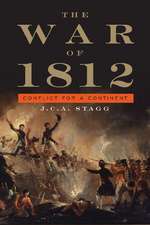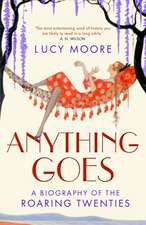The Creation of America: Through Revolution to Empire
Autor Francis Jenningsen Limba Engleză Hardback – 27 aug 2000
| Toate formatele și edițiile | Preț | Express |
|---|---|---|
| Paperback (1) | 271.22 lei 6-8 săpt. | |
| Cambridge University Press – 30 iul 2000 | 271.22 lei 6-8 săpt. | |
| Hardback (1) | 602.93 lei 6-8 săpt. | |
| Cambridge University Press – 27 aug 2000 | 602.93 lei 6-8 săpt. |
Preț: 602.93 lei
Preț vechi: 677.45 lei
-11% Nou
Puncte Express: 904
Preț estimativ în valută:
115.37€ • 120.22$ • 95.53£
115.37€ • 120.22$ • 95.53£
Carte tipărită la comandă
Livrare economică 03-17 aprilie
Preluare comenzi: 021 569.72.76
Specificații
ISBN-13: 9780521662550
ISBN-10: 0521662559
Pagini: 354
Dimensiuni: 152 x 229 x 24 mm
Greutate: 0.62 kg
Ediția:New.
Editura: Cambridge University Press
Colecția Cambridge University Press
Locul publicării:New York, United States
ISBN-10: 0521662559
Pagini: 354
Dimensiuni: 152 x 229 x 24 mm
Greutate: 0.62 kg
Ediția:New.
Editura: Cambridge University Press
Colecția Cambridge University Press
Locul publicării:New York, United States
Cuprins
Part I. England Extends Conquests to North America: 1. Preface; 2. Origins; 3. Embryonic empires; 4. Dependencies: Indians, The West; 5. Colonial variety I: Virginia; 6. Colonial variety II: New England; 7. Colonial variety III: New York; 8. Colonial variety IV: Pennsylvania; 9. Colonial variety V: South Carolina; Part II. Frictions Arise Within The Empire: 10. 'Salutary neglect'; 11. Royal prerogative in America; 12. War in principle; 13. Irritants; 14. At the core; 15. George III; 16. Reactions becoming revolution; 17. A variation on the theme of liberty; 18. Repression and resistance; 19. A battle for bishops; Part III. An American Clone Breaks Off: 20. Imperial and colonial frontiers; 21. Changing sides; 22. Defiance and crackdown; 23. Uniting for liberty, tentatively; 24. Shots heard round the world; 25. Multiple revolutions; 26. Decision; 27. Religion then and now; 28. A 'people's democracy'; 29. Liberty, virtue, empire; 30. Conquest, slavery, race; 31. Combat: multiple outbreaks; 32. Combat: the western theatre, I; 33. Combat: the northern theatre, I; 34. Combat: the northern theatre, II; 35. Saratoga; 36. Combat: the western theatre, II; 37. 'West' in the middle; 38. Combat: the southern theatre; 39. Yorktown; Part IV. The Clone Establishes its Form: 40. What next?; 41. Land; 42. People; 43. Power; Part V. More Conquests: 44. Climax; 45. In sum.
Recenzii
"This time Jennings takes on the entire British imperial establishment both at the Court of St. James and in the Crown's mini-empires in North America. In familiar style he skewers many of the notables of American popular history on his sword of justice, exposing a network of self-interest, hypocrisy, and skulduggery under the surface of revolutionary rhetoric." Anthony F. C. Wallace, University of Pennsylvania
"This is vintage Jennings. It rests on enormous learning, a large historical vision, a strong moral sense, and absolute fearlessness about saying what the author thinks is right. Agree or disagree, it compels attention." Edward Countryman, Southern Methodist University
"Jenning's account...succeeds through a fair and honest reevaluation that not only sheds light on commonly neglected areas, but also provokes thought about uncomfortable aspects of our heritage. An outstanding supplement to the many conventional histories of the American Revolution, Jenning's history offers both an objective account of the conflict and challenging insights about historical distortion." Kirkus Reviews, New York
"Jennings presents his provocative views in a readable style that expands the substance of his argument." Mark Knoblauch, 8/00 Booklist
"If you look at life with a cunical point of view...you should really like Francis Jennings' book. Jennings does such a good job of presenting the evidence that he undermines his own position. One can legitimately look at the glass as being half-full." ACE Weekly
"Throughout, Jennings looks especially at the ways in which ideas about race helped the colonists justify certain kinds of conquest. And although he does not say much that has not been argued dozens of times before, his synthesis is provocative, useful and clearly stated." Publishers Weekly
"In this sweeping revisionist account of the American Revolution, Francis Jennings dispenses with the shibboleths that have long formed the mythology surrounding the nation's birth...Jenning's self-conscious attempt to forego traditional interpretations, and their sources, moves beyond iconoclasm for its own sake, and instead provides a take on the origins of the American empire that gives balance to "mainstream" perspectives." Virgina Quarterly Review vol 77, No.3
"a remarkable set of very engaging stories...Founding Brothers is a wonderful book, one of the best collections of essays on the Founders ever written." N.Y. Review of Books March 01
"This is vintage Jennings. It rests on enormous learning, a large historical vision, a strong moral sense, and absolute fearlessness about saying what the author thinks is right. Agree or disagree, it compels attention." Edward Countryman, Southern Methodist University
"Jenning's account...succeeds through a fair and honest reevaluation that not only sheds light on commonly neglected areas, but also provokes thought about uncomfortable aspects of our heritage. An outstanding supplement to the many conventional histories of the American Revolution, Jenning's history offers both an objective account of the conflict and challenging insights about historical distortion." Kirkus Reviews, New York
"Jennings presents his provocative views in a readable style that expands the substance of his argument." Mark Knoblauch, 8/00 Booklist
"If you look at life with a cunical point of view...you should really like Francis Jennings' book. Jennings does such a good job of presenting the evidence that he undermines his own position. One can legitimately look at the glass as being half-full." ACE Weekly
"Throughout, Jennings looks especially at the ways in which ideas about race helped the colonists justify certain kinds of conquest. And although he does not say much that has not been argued dozens of times before, his synthesis is provocative, useful and clearly stated." Publishers Weekly
"In this sweeping revisionist account of the American Revolution, Francis Jennings dispenses with the shibboleths that have long formed the mythology surrounding the nation's birth...Jenning's self-conscious attempt to forego traditional interpretations, and their sources, moves beyond iconoclasm for its own sake, and instead provides a take on the origins of the American empire that gives balance to "mainstream" perspectives." Virgina Quarterly Review vol 77, No.3
"a remarkable set of very engaging stories...Founding Brothers is a wonderful book, one of the best collections of essays on the Founders ever written." N.Y. Review of Books March 01
Descriere
This alternative history of the American Revolution, first published in 2000, shows the colonists as empire-building conquerors rather than democratic revolutionaries.
